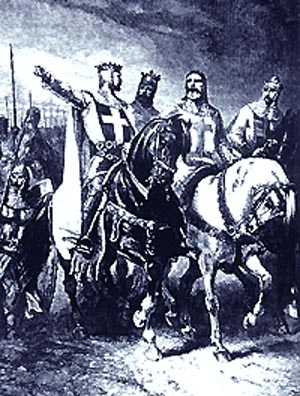 |
Consequences of Vatican II
A Counter Crusade - Are We Dealing With
a New Notion of Infallibility?
Atila Sinke Guimarães
On June 15, 1999, around 500 lay Catholic “pilgrims” made a “siege” of Jerusalem. According to press reports, these people came from 30 different countries. The day chosen for the new “siege” of Jerusalem was the supposed date of the final siege and taking of the Holy City by the crusaders more than 900 years ago. Now, however, instead of entering Jerusalem fighting and conquering like the glorious medieval Catholic crusaders, these laymen entered the city asking pardon of the Muslims they met along the way and distributing a document to this effect in the name of their “Reconciliation Walk.”
The historical symmetries are noteworthy and reveal the “pilgrims’” intent to annul in a very profound way the effect of the Crusades. I believe that Mr. Lynn Green, press spokesman and international director of the initiative, was well aware of these consequences.
Beyond the symbolic aspects, undoubtedly very important, there is also an implied doctrinary substractum. The participants of “The Reconciliation Walk” spoke in the name of the Church and assumed a dogmatic tone in some their statements. I bring to the attention of the reader two quotes to which I refer:
* “The Crusaders lifted the banner of the cross above your people. By this act they corrupted its true meaning of reconciliation, forgiveness and selfless love.”
* “We deeply regret the atrocities committed in the name of Christ by our predecessors. We renounce greed, hatred and fear and condemn all violence in the name of Jesus Christ.” (1)
1. “An Apology, 900 years in the making,” Christianity Today, September 6, 1999.

Instead of entering Jerusalem conquering like crusaders, laymen entered the city asking pardon of the Muslims |
In the first excerpt, there is a categorical statement that the taking of Jerusalem would have been “the corruption of the true meaning of the Cross.” However, everyone knows that this military expedition was convoked by Blessed Pope Urban II, who granted special indulgences to the Crusaders so that those who died in the struggle to free the Sepulchre of Christ would receive the graces necessary to take them straight to Heaven.
The Catholic fight is an example par excellence of the true meaning of the message of Our Lord, Who said, “I came not to send peace, but the sword” (Matthew 10:34). Therefore, the call for the Crusades was not a corruption of the true meaning of the Cross; nor was there any disgrace in participating in them or ardently admiring them as Catholics have done through the course of the centuries. If the Church had erred in teaching and promoting Catholic combativity, She would not be infallible, since She has done this throughout Her existence. Thus, the adoption of militancy as an essential characteristic of the Catholic Church implies infallibility. The notions of the Church Militant, the Church Triumphant and the Church Suffering presuppose that life on this earth is a battle. To change these notions would be to change the very nature of the Church.
In the second excerpt, an analysis of the lament for the “atrocities” of war shows that this is a consequence of the former apology. Either one admits there could be just war and holy war - or one does not. The shedding of blood is the natural consequence of war, just as the effusion of sweat is the consequence of partaking in sports. To lament the “atrocities” in themselves without considering the principle can easily be interpreted as sentimentalism.
What drew my attention in this report was that the laymen who “laid siege” to Jerusalem intended to “excommunicate” the militant past of the Church. This fact is astonishing because I don’t remember any precedent for this. But several other things further aggravate the problem.
First, lay men cannot make excommunications without basing themselves on the Magisterium.
Second, even if they were supported by priests and Bishops, it would not be possible to deny the Catholic past without denying the infallibility of the Church.
Third, I do not believe that even a Pope who asked pardon for the past of the Church would have the power to abolish Catholic militancy.
Another curiosity: the very persons who were asking pardon for the past of the Church were not asking pardon for the errors committed in the present. That is to say, they seem to blithely ignore the innumerable points of Vatican II that are causing the present ecclesiastical crisis. For instance, didn’t the Council - with its ecumenism and its adaptation to the modern world - tacitly renounce the missionary and militant characters of the Catholic Church? These are errors. So, why would one ask pardon for the “errors” of others, and not ask pardon for his own errors?
It would seem more modest to ask pardon first for one’s own errors. Doesn’t what we are witnessing in all these apologies display an attitude of pride? Or could it be that those who are asking pardon are convinced of a new notion of infallibility that would support their attitude?
In this case, we would have two infallibilities: the perennial conception of the infallibility of the Church and the new progressivist conception of the infallibility of the documents and thinking that would authorize its sympathizers to excommunicate anyone who opposed them.
If this hypothesis is objective, then the question rises: To which of these two infallibilities should we adhere?

Posted October, 1999
|

Related Topic of Interest
 Understanding the Crusades
Understanding the Crusades

Vatican II | Hot Topics | Home | Books | CDs | Search | Contact Us | Donate

© 2002-
Tradition in Action, Inc. All Rights Reserved
|
 |
|